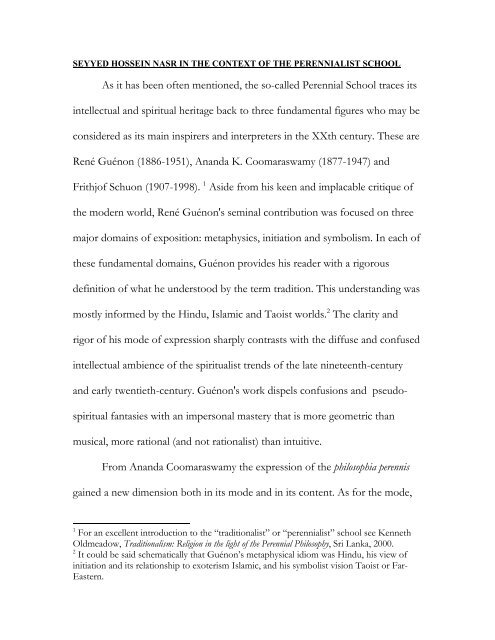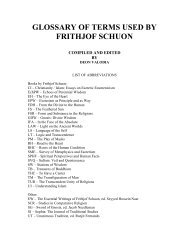Seyyed Hossein Nasr's - Sophia Perennis
Seyyed Hossein Nasr's - Sophia Perennis
Seyyed Hossein Nasr's - Sophia Perennis
Create successful ePaper yourself
Turn your PDF publications into a flip-book with our unique Google optimized e-Paper software.
13biases, and sometimes inconsistencies of the external manifestation of religioustraditions. It could be said, at least symbolically, that Schuon's spiritualpersonality is "Shivaite" whereas <strong>Nasr's</strong> is by and large "Visnuite:" Schuon is a"destroyer of illusory peace" (as suggested by his first name Frithjof) whoreduces forms to the naked essence and reintegrates them into the supraformalTruth, whereas <strong>Nasr's</strong> enterprise has to do with conserving, protecting,stabilizing and transmitting.In a sense, <strong>Seyyed</strong> <strong>Hossein</strong> <strong>Nasr's</strong> intellectual and spiritual path isdifferent from Schuon's, since the latter starts from esoterism to go towardIslam while the former has its starting point is Islam while its ultimatedestination is esoterism or gnosis. 18 In this connection, an examination of therelationship between esoterism and Islam in Schuon's writings will provide uswith a particularly relevant avenue of understanding Schuon’s notion of"quintessential esoterism" and the extent to which it must be distinguishedfrom Nasr’s understanding of esoterism. 19 It could be said that, through his17 “Esoterism is without a country and it establishes itself wherever it can.” Le Soufismevoile et quintessence, p.45.18 This “direction” is moreover related to Nasr’s tendency to bring the entire religion intoesoterism, so to speak; and this is no doubt in keeping with major trends of Islamicesoterism. “Islam has the tendency — in Sufism — either to reduce or to bring the entirereligion to esoterism; a tendency particularly marked in the Shiites, who go so far as to makegnosis a confessional article of faith.” Frithjof Schuon, “Concerning Delimitations inMoslem Spirituality”, In the Face of the Absolute.19 Nasr tends to equate Schuon’s universalist perspective with that of famous Sufi like Ibn‘Arabî or Rûmî. Such an identification is only partially valid however, as Schuon hasexplained himself in Sufism, veil and quintessence. The traditional Sufi leaning towarduniversality must be situated in the context of love’s abolition of boundaries and limitations,
16if he is allowed to do so by an ambience that is not likely to be conducive tosuch a "breaking", to look for the haqîqah hidden in the form. On the contrary,the perspective of quintessential esoterism will allow, in principle, for the fullestor maximal manifestation of the "nature of things" in doctrinal and methodicalmatters. Its reference point will be "things as they are" rather than things asthey are providentially envisaged by Islam. This difference stems from the factthat integral esoterism will tend to consider Islam as a "validation" of the truth,rather than considering itself as a "validation" of Islam. When esoterism isprimarily envisaged as a validation of Islam, some of its aspects are cast aside orlooked upon with suspicion or unease, precisely because they do not necessarilyfit the mold of the Islamic upâya or other traditional "frames of mind." Bycontrast, quintessential esoterism will not consider the entire formal complexof Islam as compatible with its perspective, 21 which is why it will focus on thecentral and essential elements of its spiritual perspective, those which mayprovide a direct entrance into the haqîqah. On the one hand, esoterism will keepthe confessional and ethnic limitations of Islam at bay, on the other it willunderstand its central tenets and practices from the point of view of universalgnosis. As Schuon has illustrated this point in an unpublished text: performing21 A case in point is the network of juridical injunctions upon which the exoterist mentalityparticularly flourishes and thrives. Another example would be what Schuon calls a pedanticor “meticulous karma-yoga” in ritual matters, which must not be confused with animpeccable attention to the performance of daily rites.
17the çalât will not be conceived and lived as the fulfillment of an Islamic duty, itwill rather be envisaged as a direct expression of the relationship between manand God. This amounts to saying that quintessential esoterism will neverconsider Islam independently from the nature of things and from the integralstructure of reality. By contrast, it could be said that "esoteric Islam" will neverallow itself to consider esoterism independently from Islam. 22 Finally, a majorconcomitance of the contrast of what has just been sketched lies in the factthat, whereas integral esoterism is always "confortable" with recognizing thelegitimacy of more exoteric and formalistic perspectives, partial esoterismexperiences a tension between its call to universality and its sentimentalsolidarity with Islam. This tension will more than often result in anathemasagainst all intellectual and existential manifestations of esoterism that appear tolie outside the strict and conventional cadre of the Islamic tradition, or at leastoutside its recorded and accepted historical manifestations.Another relevant aspect of this distinction is related to the gradualprocess of assimilation of the truth, or to the logical and chronologicalsequence in which a spiritual seeker will proceed:22 This appears for example in the way in which Nasr reads Schuon’s entire metaphysics,including his writings on religions other than Islam, as a commentary on the shahâdah, anassertion that is literally impeccable but which has the obvious inconvenience of appearingto “annex” traditional metaphysics to the Islamic territory. By contrast, Schuon has tirelesslywritten and asserted that his doctrinal point of departure is the Advaita Vedânta. Hisconceptual language is Advaitin, much more so than it is Sufi.
21“theological, psychological and legalistic meanders foreign to its nature” thatform the external and collective characters of a given tradition. The objectionthat is often raised against this consistent understanding of esoterism lies inSchuon’s assertion that –outside of an infinitesimally small quantity ofexceptions-- esoterism cannot be practiced independently from an exotericframework. The fact is that this has never been in doubt for any serious readersof Schuon, all the more so for any of those who situate themselves in hisspiritual wake. The real questions that this truism tends to veil are thefollowing: --to what extent and in what ways does the independence ofprinciple that the esoteric outlook enjoys vis-à-vis traditional forms affect theintellectual outlook and spiritual practices of the esoterist, --and what are theconsequences of this esoteric outlook upon the relationship between theesoterist and the collective psychic climate of any given tradition, including thatin which he has “established itself”, to use Guénon’s term? Schuon’s answersto these questions are crystal-clear. With respect to the intellectual perspectiveof gnosis, it is unambiguously stated that it is independent from objectionsfrom the traditional framework:The ‘subjective supernatural’ has need –‘accidentally’ and not ‘essentially’—ofthe ‘objective supernatural’, but once it is thus ‘awakened to itself’ by whatcorresponds to it outside of us, no extrinsic objection can concern it further. 2928 Frithjof Schuon, Survey of Metaphysics and Esoterism, Bloomington: 1986, p.115.29 Frithjof Schuon, Gnosis, Divine Wisdom, Bedfont: 1990, p.32
22As for the spiritual practices, it is no less clear that they are essentiallycontained in the inner core of the tradition, that is quintessential prayer:The Dhikr contains the whole Law (Shari’ah) and it is the reason for theexistence of the whole Law; 30 this is declared by the Koranic verse: “Verilyprayer (the exoteric practice) prevents man from committing what is shameful(sullying) and blameworthy; and verily the remembrance (invocation) of God(the esoteric practice) is greater. (Sura of the Spider, 45). 31 The formula “theremembrance of God is greater” or “the greatest thing” (Wa la-dhikru ‘Llahiakbar) evokes and paraphrases the following words from the Canonical Prayer:“God is greater” or “the greatest” (Allahu akbar) and this indicates a mysteriousconnection between God and His Name; it also indicates a certain relativity —from the point of view of gnosis — of the outward rites, which arenevertheless indispensable in principle and in the majority of cases. 32 In thisconnection we could also quote the following hadith: one of the Companionssaid to the Prophet: “0 Messenger of God, the prescriptions of Islam are toonumerous for me; tell me something that I can hold fast to.” The Prophetreplied: “Let thy tongue always be supple (in movement) with the mention (theremembrance) of God.” This hadith, like the verse we have just quoted,expresses by allusion (isharah) the principle of the inherence of the wholeShari’ah in the Dhikr alone. 33The concentration on quintessential prayer is both the ultimate limit of theinteriorizing and “deepening of the symbols of exoterism” –in so far as theDivine Name is the essence of the whole tradition-- and the supreme30 “ This is the point of view of all invocatory disciplines, such as the Hindu japa-yoga or theAmidist nembutsu (buddhanusmriti). This yoga is found in jnana as well as in bhakti: “Repeat theSacred Name of the Divinity,” said Shankaracharya in one of his hymns.” Ibid.31 “God and His Name are identical,” as Ramakrishna said; and he certainly was not the firstto say so.32 This reservation (“indispensable in principle and in the majority of cases”) does notcontradict the principle of “the inherence of the whole Sharî’ah in the Dhikr alone.” First, itapplies to the central rites of the religion and not necessarily to the whole host of traditionalpractices and juridical edicts that the tradition carries in its wake. Second, the expression “inprinciple” suggests the possibility of legitimate “facts” that would not conform to it. Thirdly,the reference to the “majority of cases” leaves room for exceptions and points to a collectivenorm and equilibrium rather than to an absolute spiritual necessity.33 Cf. Le Soufisme voile et quintessence, Paris, 1980, p.126.
23“affirmation of the independence of the essence vis-à-vis form“ ---inasmuch asit may absorb the whole traditional form. 34As for the non-identification of the gnostic with the limitative aspects ofthe collective ambience of a given tradition, Schuon has extensively delvedinto this issue, especially in Sufism, veil and quintessence. This question isessentially connected to Schuon’s discussion of the spiritual function of thecaste system.The advantage of the Hindu system is that it greatly favors the purity ofesoteric spirituality; in the absence of such a system, esoterism becomes tooclosely linked with the average collective mentality which cannot beproportionate to the demands of a disinterested perspective or, in other words,cannot be entirely free from denominational narcissism. 35*Let us conclude with a few further reflections on Schuon and <strong>Nasr's</strong>perspectives on religion in the modern world. Schuon's explicit objective isminimally expressed as a wish to restore the sense of prayer in the life of a fewof his readers: "if our writings had on average no other result than that of34 “We have here the two essential aspects of plenary esoterism: on the one hand the penetration of thesymbols of exoterism and on the other hand, on the contrary, the affirmation of the independence — andpre-excellence — of essence with regard to forms, or of substance with regard to accidents, that is,precisely, the formulations of the common religion. As regards this “non-conformist” aspect of esoterism,we would say, by way of illustration, that the abrogations of Koranic verses on the one hand and thematrimonial exceptions in the life of the Prophet on the other hand, are there to indicate respectively therelativity of the formal Revelation and of social morality; which amounts to saying that these abrogationsand exceptions pertain to the esoteric perspective, leaving aside their immediate and practical significance.”Cf. Le Soufisme, p.33.35 Le Soufisme, p.83.



